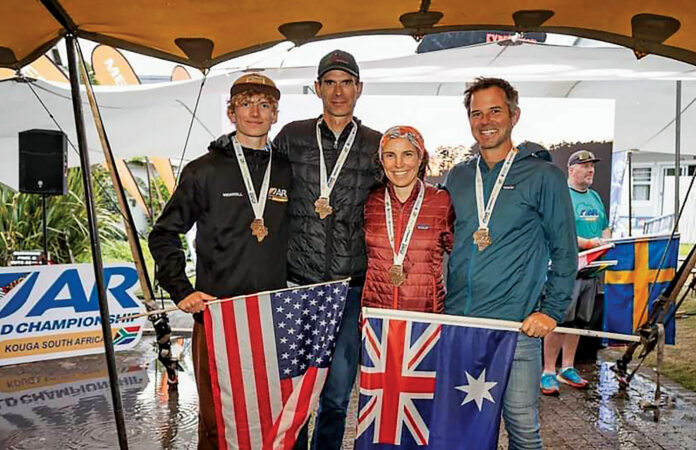When it comes to adventure, people have different comfort levels. For some, it’s trekking the wooden path into the butterfly-laden trees at Natural Bridges; for others, it’s scaling Half Dome in Yosemite, battling white water rapids in Utah or driving Bear Creek Road during commute hours.
But for Johnny Ryan and his 16-year-old son Cian (KEE-ehn) of Ben Lomond, a multi-day trek through South Africa is just what the doctor ordered.
The father-son duo embarked on the 2023 Adventure Racing World Championship: Expedition Africa, which took place through the Kouga region of the Eastern Cape starting Oct. 19. Set to endure the nine-day challenge with two other competitors on Team Lucky—Team Captain Mila Olsen of Placerville and Jade Eagles of Los Angeles—their team managed to place 87th out of 109 international teams.
While only 40 teams completed the full course, the Ryans withdrew from Team Lucky after just five days.
“I came down with gastrointestinal issues during the race and needed to drop out so the team could continue,” Johnny said.
Since the goal was for Cian and Johnny to compete together, the younger Ryan threw in the towel when his dad did. When the competition is a multi-day grueling trek, there’s no recovery time for the sick or injured; it’s all about the adventure.
For Cian, just participating in the event was winning—at 16 years old, Cian was the youngest person to compete in the biggest expedition adventure race in history. While Cian would consider doing a shorter race at some other time, Johnny said the multi-day expedition races are a once-in-a-lifetime experience.
Expedition Africa is an 800 kilometer (497 miles) challenge of an unsupported, seven-to-nine day nonstop race through punishing terrain. Travel methods included trekking on foot, mountain biking, kayaking, abseiling (rappelling) and all of it is achieved with only a map and compass—no GPS or cell phones allowed.
Just getting to the starting line took 44 hours of travel and months of preparation; the race starts long before teams even land in South Africa.
Johnny, 49, refers to the race as an ultra-endurance sport where your goal is to keep moving the entire time, allowing for very little sleep.
While adventure racing was born in New Zealand and has been around for 50 years, Johnny got the race bug about 20 years ago after learning about the American version of the sport: Eco-Challenge. The first Eco-Challenge was held on April 25, 1995, in the Utah desert under the guidance of television producer Mark Burnett of “Survivor” fame and was held each year in a new locale until 2002.
Johnny last raced in 2008, when Cian was just a year old, but in 2022, Team Lucky completed a 30-hour national championship race in Mammoth where they placed seventh overall; they won free entry into the South African challenge from a lottery drawing of the top 10 finishing teams.
Expedition Africa teams are generally composed of professional adventure racers who train 40 hours a week for the event, so the Ryans were just pleased to participate.
“We weren’t expecting to place well; for us, it was the adventure and experience of doing the race together,” Johnny said.
While Johnny had experienced the grueling hardships of adventure racing before, this was all new territory for Cian.
“I exercised and tried to get my endurance up, but I really had no idea what I was getting into,” said the San Lorenzo Valley High School junior. “The sleep deprivation was the worst part for me. It was all hard in its own way, and there wasn’t one moment that was particularly difficult, but everything is tougher when you’re exhausted.”
Cian added that the hardest portion of the race was when it rained all day and turned everything to sludge.
“That was difficult to get through, but we made it,” he said.
Johnny concurred about that slippery situation: “We were soaked straight through, and it got pretty cold at night. We were climbing up these mountains in near hypothermic conditions, and we climbed so slowly that we ran out of food. That leg was anticipated to take about 30 hours, and it took us 52. We couldn’t find water for 12 hours or so, and since you carry filters, you don’t carry much water with you.”
After the first two days with no sleep, the team stopped and slept for an hour or so in an abandoned hut that was filled with mouse droppings.
“It had a little fireplace, and the teams before us had started a fire, so we were able to warm up a bit. Our clothes never fully dried out, but that was just part of the experience,” Johnny said.
Their team also met ranchers who lived in small huts and had little to no money.
“They just lived off the land with sheep and pigs running around, and everyone was very nice. At one point, we needed matches to use our food dehydrator, and all of our matches had gotten soaked in the rain. We came across this woman who lived in a hut and didn’t have much of anything, but she gave us some matches to use. Those are the encounters I’ll remember,” said the elder Ryan. “There was extreme poverty, and even with nothing, the people we met were so happy and willing to help us. They all had hope.”
In terms of competitive challenges, Cian said the abseiling was the most difficult.
“I had never done that before, so I had to learn on the spot. There were some instructors there to help me through it, and completing that part of the race was a highlight for me,” he said.
The biggest question the Ryans are asked is why they race.
“When you get home and everyday problems arise, they don’t seem so bad. You figure if you can endure days with no sleep, no food and no water, everything else is manageable. Plus, we see things and people when we race that we normally never would,” Johnny said.
He told the story of coming across a rancher who was butchering kudu (members of the antelope family) with his 3-year-old daughter present: “He showed us some horns he had, and gave us some water, too.”
As far as a language barrier, Johnny said that all South Africans speak English, along with one of the 14 dialects of Afrikaans based on their tribal affiliation.
“It makes it easier when traveling through their country,” he said.
To learn more about the trek the Ryans experienced, watch a video at this link: https://youtu.be/6P5TpK6dGKs.










